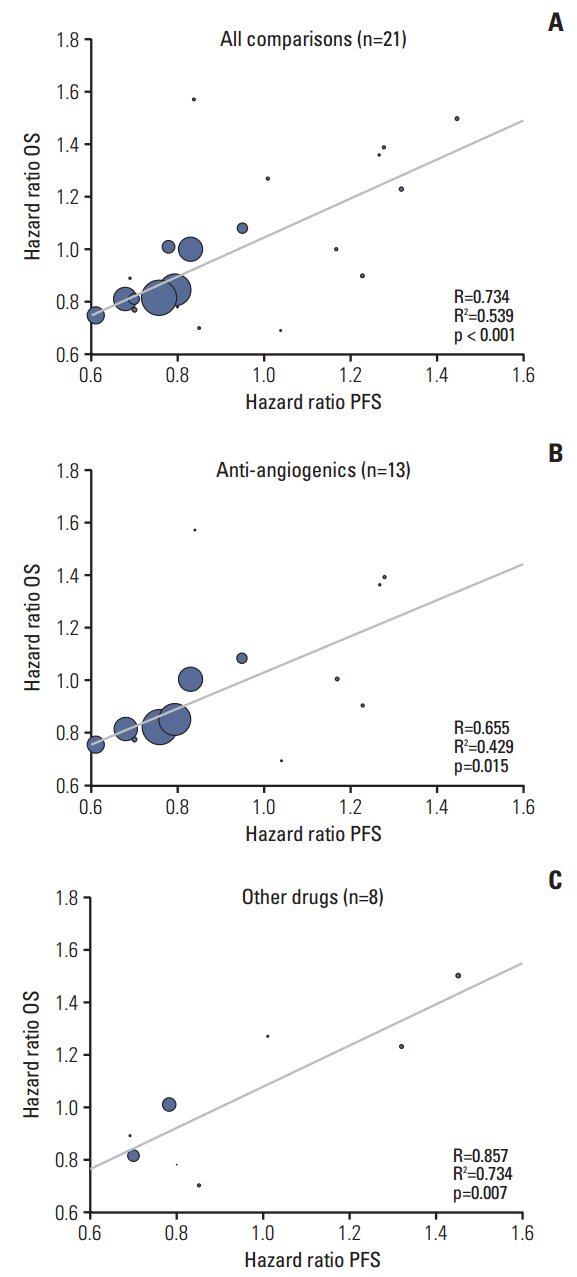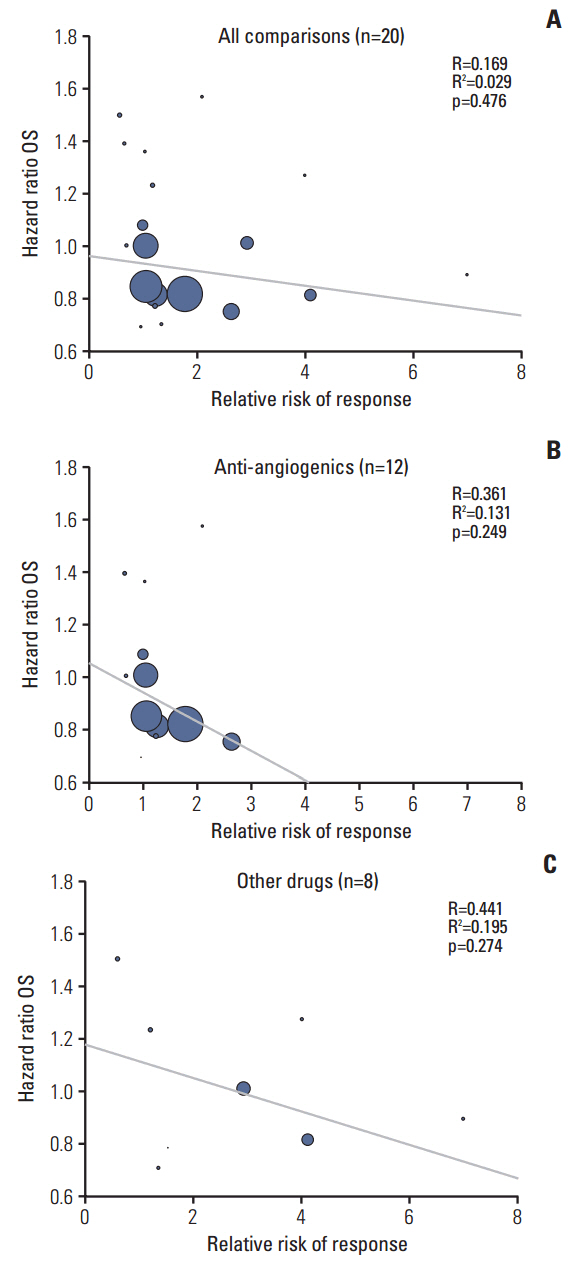Cancer Res Treat.
2017 Jul;49(3):834-845. 10.4143/crt.2016.249.
Surrogate Endpoints in Second-Line Trials of Targeted Agents in Metastatic Colorectal Cancer: A Literature-Based Systematic Review and Meta-Analysis
- Affiliations
-
- 1Unit of Medical Oncology, Azienda Ospedaliero-Universitaria Pisana, Department of Translational Research and New Technologies in Medicine, University of Pisa, Pisa, Italy.
- 2Medical Oncology Department, Fondazione IRCCS Istituto Nazionale dei Tumori, Milan, Italy.
- 3Department of Oncology, University of Turin, A.O.U. San Luigi Gonzaga, Turin, Italy.
- 4Department of Oncology, University of Turin, A.O. Ordine Mauriziano, Turin, Italy. massimo.dimaio@unito.it
- KMID: 2388329
- DOI: http://doi.org/10.4143/crt.2016.249
Abstract
- PURPOSE
The purpose of this study was to evaluate progression-free survival (PFS) and objective response rate (ORR) as surrogate endpoints of overall survival (OS) in modern clinical trials investigating the efficacy of targeted agents in the second-line treatment of metastatic colorectal cancer (mCRC).
MATERIALS AND METHODS
A systematic search of literature pertaining to randomized phase II and III trials evaluating targeted agents as second-line treatments for mCRC was performed. The strength of the correlation between both PFS and ORR and OS was assessed based on the Pearson's correlation coefficient (R) and the coefficient of determination (R²).
RESULTS
Twenty trials, including a total of 7,571 patients, met the search criteria. The median duration of post-progression survival (PPS) was 7.6 months. The median differences between experimental and control arms were 0.65 months (range, -2.4 to 3.4) for the median PFS and 0.7 months (range, -5.8 to 3.9) for the median OS. PFS and ORR showed moderate (R=0.734, R²=0.539, p < 0.001) and poor correlation (R=0.169, R²=0.029, p=0.476) with OS, respectively. No differences between anti-angiogenic agents and other drugs were evident.
CONCLUSION
Targeted agents investigated in the second-line treatment of mCRC provided minimal PFS gains translating into modest OS improvements. Considering both the moderate correlation between PFS and OS and the short duration of PPS, the OS should remain the preferred primary endpoint for randomized clinical trials in the second-line treatment of mCRC.
MeSH Terms
Figure
Reference
-
References
1. Buyse M, Thirion P, Carlson RW, Burzykowski T, Molenberghs G, Piedbois P. Relation between tumour response to first-line chemotherapy and survival in advanced colorectal cancer: a meta-analysis. Meta-Analysis Group in Cancer. Lancet. 2000; 356:373–8.2. Tang PA, Bentzen SM, Chen EX, Siu LL. Surrogate end points for median overall survival in metastatic colorectal cancer: literature-based analysis from 39 randomized controlled trials of first-line chemotherapy. J Clin Oncol. 2007; 25:4562–8.
Article3. Petrelli F, Pietrantonio F, Cremolini C, Di Bartolomeo M, Coinu A, Lonati V, et al. Early tumour shrinkage as a prognostic factor and surrogate end-point in colorectal cancer: a systematic review and pooled-analysis. Eur J Cancer. 2015; 51:800–7.
Article4. Buyse M, Burzykowski T, Carroll K, Michiels S, Sargent DJ, Miller LL, et al. Progression-free survival is a surrogate for survival in advanced colorectal cancer. J Clin Oncol. 2007; 25:5218–24.
Article5. Giessen C, Laubender RP, Ankerst DP, Stintzing S, Modest DP, Schulz C, et al. Surrogate endpoints in second-line treatment for mCRC: a systematic literature-based analysis from 23 randomised trials. Acta Oncol. 2015; 54:187–93.
Article6. Petrelli F, Barni S. Correlation of progression-free and post-progression survival with overall survival in advanced colorectal cancer. Ann Oncol. 2013; 24:186–92.
Article7. Giessen C, Laubender RP, Ankerst DP, Stintzing S, Modest DP, Mansmann U, et al. Progression-free survival as a surrogate endpoint for median overall survival in metastatic colorectal cancer: literature-based analysis from 50 randomized first-line trials. Clin Cancer Res. 2013; 19:225–35.
Article8. Sidhu R, Rong A, Dahlberg S. Evaluation of progression-free survival as a surrogate endpoint for survival in chemotherapy and targeted agent metastatic colorectal cancer trials. Clin Cancer Res. 2013; 19:969–76.
Article9. Shi Q, de Gramont A, Grothey A, Zalcberg J, Chibaudel B, Schmoll HJ, et al. Individual patient data analysis of progression-free survival versus overall survival as a first-line end point for metastatic colorectal cancer in modern randomized trials: findings from the analysis and research in cancers of the digestive system database. J Clin Oncol. 2015; 33:22–8.
Article10. Ciani O, Buyse M, Garside R, Peters J, Saad ED, Stein K, et al. Meta-analyses of randomized controlled trials show suboptimal validity of surrogate outcomes for overall survival in advanced colorectal cancer. J Clin Epidemiol. 2015; 68:833–42.
Article11. Cohn AL, Tabernero J, Maurel J, Nowara E, Sastre J, Chuah BY, et al. A randomized, placebo-controlled phase 2 study of ganitumab or conatumumab in combination with FOLFIRI for second-line treatment of mutant KRAS metastatic colorectal cancer. Ann Oncol. 2013; 24:1777–85.
Article12. Cunningham D, Wong RP, D'Haens G, Douillard JY, Robertson J, Stone AM, et al. Cediranib with mFOLFOX6 vs bevacizumab with mFOLFOX6 in previously treated metastatic colorectal cancer. Br J Cancer. 2013; 108:493–502.
Article13. Hecht JR, Bendell JC, Vyushkov D, Bencardino K, Verma UN, Yang Y, et al. A phase II, randomized, double-blinded, placebo-controlled study of simtuzumab or placebo in combination with FOLFIRI for the second line treatment of metastatic KRAS mutant colorectal adenocarcinoma. J Clin Oncol. 2015; (Suppl):Abstr 3537.
Article14. O'Neil BH, Cainap C, Van Cutsem E, Gorbunova V, Karapetis CS, Berlin J, et al. Randomized phase II open-label study of mFOLFOX6 in combination with linifanib or bevacizumab for metastatic colorectal cancer. Clin Colorectal Cancer. 2014; 13:156–63.15. Bendell JC, Tournigand C, Swieboda-Sadlej A, Barone C, Wainberg ZA, Kim JG, et al. Axitinib or bevacizumab plus FOLFIRI or modified FOLFOX-6 after failure of first-line therapy for metastatic colorectal cancer: a randomized phase II study. Clin Colorectal Cancer. 2013; 12:239–47.
Article16. Bennouna J, Sastre J, Arnold D, Osterlund P, Greil R, Van Cutsem E, et al. Continuation of bevacizumab after first progression in metastatic colorectal cancer (ML18147): a randomised phase 3 trial. Lancet Oncol. 2013; 14:29–37.
Article17. Cao R, Zhang S, Ma D, Hu L. A multi-center randomized phase II clinical study of bevacizumab plus irinotecan, 5-fluorouracil, and leucovorin (FOLFIRI) compared with FOLFIRI alone as second-line treatment for Chinese patients with metastatic colorectal cancer. Med Oncol. 2015; 32:325.
Article18. Ciardiello F, Normanno N, Martinelli E, Troiani T, Cardone C, Nappi A, et al. Cetuximab beyond progression in RAS wild type (WT) metastatic colorectal cancer (mCRC): the CAPRIGOIM randomized phase II study of FOLFOX versus FOLFOX plus cetuximab. Ann Oncol. 2015; (26 Suppl 4):Abstr LBA-09.19. Eng C, Hart LL, Severtsev A, Gladkov O, Mueller L, Kopp MV, et al. A randomized, placebo-controlled, phase I/II study of tivantinib (ARQ 197) in combination with cetuximab and irinotecan in patients (pts) with KRAS wild-type (WT) metastatic colorectal cancer (CRC) who had received previous front-line systemic therapy. J Clin Oncol. 2013; 31(Suppl):Abstr 3508.
Article20. Giantonio BJ, Catalano PJ, Meropol NJ, O'Dwyer PJ, Mitchell EP, Alberts SR, et al. Bevacizumab in combination with oxaliplatin, fluorouracil, and leucovorin (FOLFOX4) for previously treated metastatic colorectal cancer: results from the Eastern Cooperative Oncology Group Study E3200. J Clin Oncol. 2007; 25:1539–44.
Article21. Hoehler T, Decker T, Schimanski C, Schmitz SH, Kanzler S, Rauh J, et al. Final results of the AIO 0307 study: a controlled, randomized, double-blind phase II study of FOLFOX6 or FOLFIRI combined with sorafenib (S) versus placebo (P) in second-line metastatic colorectal carcinoma (mCRC) treatment. J Clin Oncol. 2013; 31(Suppl):Abstr 3586.
Article22. Iwamoto S, Takahashi T, Tamagawa H, Nakamura M, Munemoto Y, Kato T, et al. FOLFIRI plus bevacizumab as second-line therapy in patients with metastatic colorectal cancer after first-line bevacizumab plus oxaliplatin-based therapy: the randomized phase III EAGLE study. Ann Oncol. 2015; 26:1427–33.
Article23. Masi G, Salvatore L, Boni L, Loupakis F, Cremolini C, Fornaro L, et al. Continuation or reintroduction of bevacizumab beyond progression to first-line therapy in metastatic colorectal cancer: final results of the randomized BEBYP trial. Ann Oncol. 2015; 26:724–30.
Article24. Peeters M, Strickland AH, Lichinitser M, Suresh AV, Manikhas G, Shapiro J, et al. A randomised, double-blind, placebo-controlled phase 2 study of trebananib (AMG 386) in combination with FOLFIRI in patients with previously treated metastatic colorectal carcinoma. Br J Cancer. 2013; 108:503–11.
Article25. Peeters M, Oliner KS, Price TJ, Cervantes A, Sobrero AF, Ducreux M, et al. Analysis of KRAS/NRAS mutations in a phase III study of panitumumab with FOLFIRI compared with FOLFIRI alone as second-line treatment for metastatic colorectal cancer. Clin Cancer Res. 2015; 21:5469–79.
Article26. Seymour MT, Brown SR, Middleton G, Maughan T, Richman S, Gwyther S, et al. Panitumumab and irinotecan versus irinotecan alone for patients with KRAS wild-type, fluorouracil-resistant advanced colorectal cancer (PICCOLO): a prospectively stratified randomised trial. Lancet Oncol. 2013; 14:749–59.
Article27. Tabernero J, Yoshino T, Cohn AL, Obermannova R, Bodoky G, Garcia-Carbonero R, et al. Ramucirumab versus placebo in combination with second-line FOLFIRI in patients with metastatic colorectal carcinoma that progressed during or after first-line therapy with bevacizumab, oxaliplatin, and a fluoropyrimidine (RAISE): a randomised, double-blind, multicentre, phase 3 study. Lancet Oncol. 2015; 16:499–508.
Article28. Van Cutsem E, Bajetta E, Valle J, Kohne CH, Hecht JR, Moore M, et al. Randomized, placebo-controlled, phase III study of oxaliplatin, fluorouracil, and leucovorin with or without PTK787/ZK 222584 in patients with previously treated metastatic colorectal adenocarcinoma. J Clin Oncol. 2011; 29:2004–10.
Article29. Van Cutsem E, Tabernero J, Lakomy R, Prenen H, Prausova J, Macarulla T, et al. Addition of aflibercept to fluorouracil, leucovorin, and irinotecan improves survival in a phase III randomized trial in patients with metastatic colorectal cancer previously treated with an oxaliplatin-based regimen. J Clin Oncol. 2012; 30:3499–506.
Article30. Vieitez JM, Valladares M, Pelaez I, de Sande Gonzalez L, Garcia-Foncillas J, Garcia-Lopez JL, et al. A randomized phase II study of raltitrexed and gefitinib versus raltitrexed alone as second line chemotherapy in patients with colorectal cancer. (1839IL/0143). Invest New Drugs. 2011; 29:1038–44.
Article31. Jawed I, Wilkerson J, Prasad V, Duffy AG, Fojo T. Colorectal cancer survival gains and novel treatment regimens: a systematic review and analysis. JAMA Oncol. 2015; 1:787–95.32. Ellis LM, Bernstein DS, Voest EE, Berlin JD, Sargent D, Cortazar P, et al. American Society of Clinical Oncology perspective: Raising the bar for clinical trials by defining clinically meaningful outcomes. J Clin Oncol. 2014; 32:1277–80.
Article33. Hotta K, Suzuki E, Di Maio M, Chiodini P, Fujiwara Y, Takigawa N, et al. Progression-free survival and overall survival in phase III trials of molecular-targeted agents in advanced non-small-cell lung cancer. Lung Cancer. 2013; 79:20–6.
Article34. Buyse M, Molenberghs G, Burzykowski T, Renard D, Geys H. The validation of surrogate endpoints in meta-analyses of randomized experiments. Biostatistics. 2000; 1:49–67.35. Kim C, Prasad V. Cancer drugs approved on the basis of a surrogate end point and subsequent overall survival: an analysis of 5 years of US Food and Drug Administration approvals. JAMA Intern Med. 2015; 175:1992–4.
- Full Text Links
- Actions
-
Cited
- CITED
-
- Close
- Share
- Similar articles
-
- Meta-epidemiology
- Optimized Image-Based Surrogate Endpoints in Targeted Therapies for Glioblastoma: A Systematic Review and Meta-Analysis of Phase III Randomized Controlled Trials
- Transanal tube placement for prevention of anastomotic leakage following low anterior resection for rectal cancer: a systematic review and meta-analysis
- Systematic Review and Meta-analysis in Digestive Cancer Research
- Chemotherapy for Colorectal Cancer





